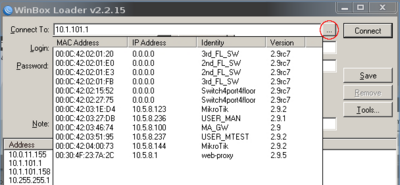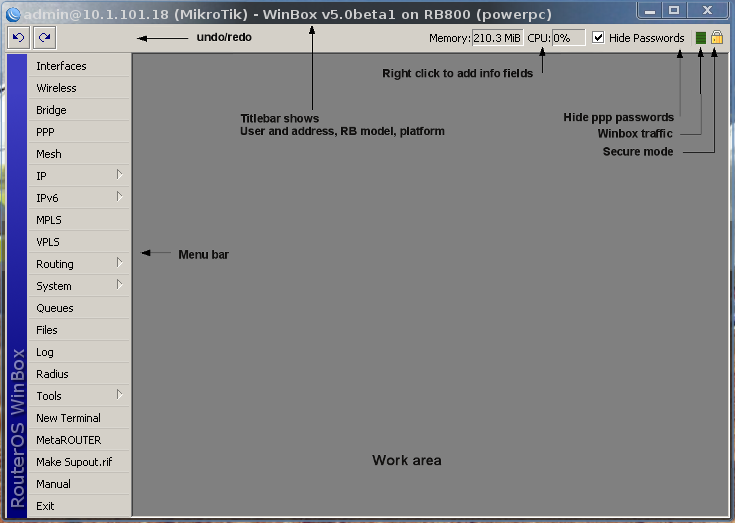Manual:First time startup: Difference between revisions
No edit summary |
|||
| Line 5: | Line 5: | ||
After you have installed the RouterOS software, or turned on the Router for the first time, there are various ways how to connect to it: | After you have installed the RouterOS software, or turned on the Router for the first time, there are various ways how to connect to it: | ||
* Accessing Command Line Interface ([[M:Console |CLI]]) via Telnet, ssh, serial cable or even keyboard and monitor if router has VGA card. | * Accessing Command Line Interface ([[M:Console |CLI]]) via Telnet, ssh, serial cable or even keyboard and monitor if router has VGA card. | ||
* Accessing Web based GUI | * Accessing Web based GUI ([[M:WebFig | WebFig]]) | ||
* Using [[M:Winbox | WinBox]] configuration utility | * Using [[M:Winbox | WinBox]] configuration utility | ||
Revision as of 09:21, 4 October 2011
Overview
After you have installed the RouterOS software, or turned on the Router for the first time, there are various ways how to connect to it:
- Accessing Command Line Interface (CLI) via Telnet, ssh, serial cable or even keyboard and monitor if router has VGA card.
- Accessing Web based GUI ( WebFig)
- Using WinBox configuration utility
Every router is factory pre-configured with IP address 192.168.88.1/24 on ether1 port. Default username is admin with empty password.
Additional configuration may be set depending on RouterBoard model. For example, RB750 ether1 is configured as WAN port and any communication with the router through that port is not possible. List of RouterBOARD models and their default configurations can be found in this article.
Winbox
Winbox is configuration utility that can connect to the router via MAC or IP protocol. Latest winbox version can be downloaded from our demo router.
Run Winbox utility, then click the [...] button and see if Winbox finds your Router and it's MAC address. Winbox neighbor discovery will discover all routers on the broadcast network. If you see routers on the list, connect to it by clicking on MAC address and pressing Connect button.

Winbox will try download plugins from the router, if it is connecting for the first time to the router with current version. Note that it may take about one minute to download all plugins if winbox is connected with MAC protocol.
This method works with any device that runs RouterOS. Your PC needs to have MTU 1500
After winbox have successfully downloaded plugins and authenticated, main window will be displayed:

If winbox cannot find any routers, make sure that your Windows computer is directly connected to the router with an Ethernet cable, or at least they both are connected to the same switch. As MAC connection works on Layer2, it is possible to connect to the router even without IP address configuration. Due to the use of broadcasting MAC connection is not stable enough to use continuously, therefore it is not wise to use it on a real production / live network!. MAC connection should be used only for initial configuration.
Follow winbox manual for more information.
CLI
Command Line Interface (CLI) allows configuration of the router's settings using text commands. Since there is a lot of available commands, they are split into groups organized in a way of hierarchical menu levels. Follow console manual for CLI syntax and commands.
There are several ways how to access CLI:
- winbox terminal
- telnet
- ssh
- serial cable etc.
Serial Cable
If your device has a Serial port, you can use a console cable (or Null modem cable)
Plug one end of the serial cable into the console port (also known as a serial port or DB9 RS232C asynchronous serial port) of the RouterBOARD and the other end in your PC (which hopefully runs Windows or Linux). You can also use a USB-Serial adapter. Run a terminal program (HyperTerminal, or Putty on Windows) with the following parameters for All RouterBOARD models except 230:
115200bit/s, 8 data bits, 1 stop bit, no parity, flow control=none by default.
RouterBOARD 230 parameters are:
9600bit/s, 8 data bits, 1 stop bit, no parity, hardware (RTS/CTS) flow control by default.
If parameters are set correctly you should be able to see login prompt. Now you can access router by entering username and password:
MikroTik 4.15 MikroTik Login: MMM MMM KKK TTTTTTTTTTT KKK MMMM MMMM KKK TTTTTTTTTTT KKK MMM MMMM MMM III KKK KKK RRRRRR OOOOOO TTT III KKK KKK MMM MM MMM III KKKKK RRR RRR OOO OOO TTT III KKKKK MMM MMM III KKK KKK RRRRRR OOO OOO TTT III KKK KKK MMM MMM III KKK KKK RRR RRR OOOOOO TTT III KKK KKK MikroTik RouterOS 4.15 (c) 1999-2010 http://www.mikrotik.com/ [admin@MikroTik] >
Detailed description of CLI login is in login process section.
Monitor and Keyboard
If your device has a graphics card (ie. regular PC) simply attach a monitor to the video card connector of the computer (note: RouterBOARD products don't have this, so use Method 1 or 2) and see what happens on the screen. You should see a login promt like this:
MikroTik v3.16 Login:
Enter admin as the login name, and hit enter twice (because there is no password yet), you will see this screen:
MMM MMM KKK TTTTTTTTTTT KKK MMMM MMMM KKK TTTTTTTTTTT KKK MMM MMMM MMM III KKK KKK RRRRRR OOOOOO TTT III KKK KKK MMM MM MMM III KKKKK RRR RRR OOO OOO TTT III KKKKK MMM MMM III KKK KKK RRRRRR OOO OOO TTT III KKK KKK MMM MMM III KKK KKK RRR RRR OOOOOO TTT III KKK KKK MikroTik RouterOS 3.16 (c) 2008 http://www.mikrotik.com/ Terminal ansi detected, using single line input mode [admin@router] >
Now you can start configuring the router, by issuing the setup command.
This method works with any device that has a video card and keyboard connector
[ Top | Back to Content ]
